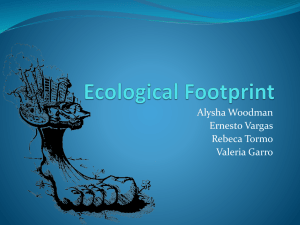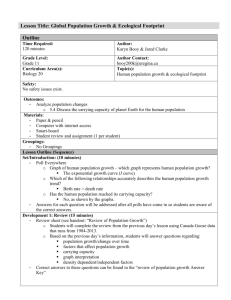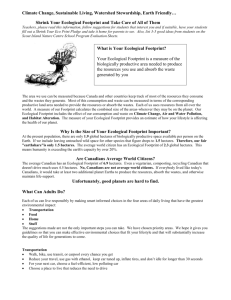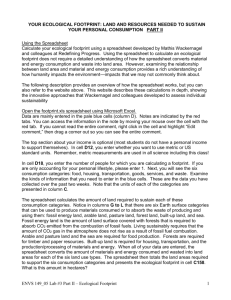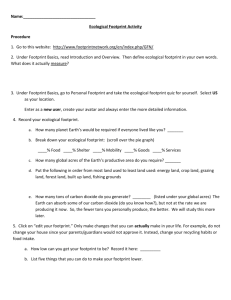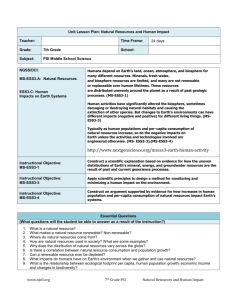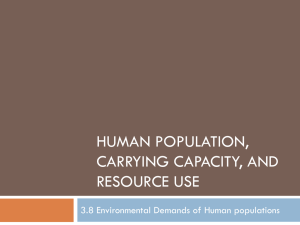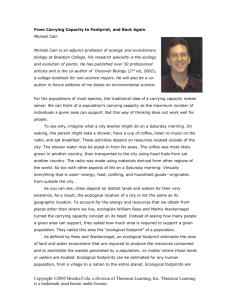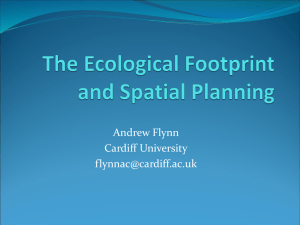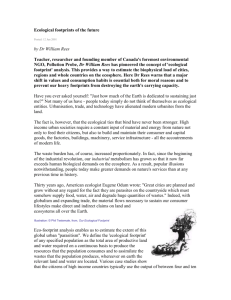Ecological Footprint Activity
advertisement
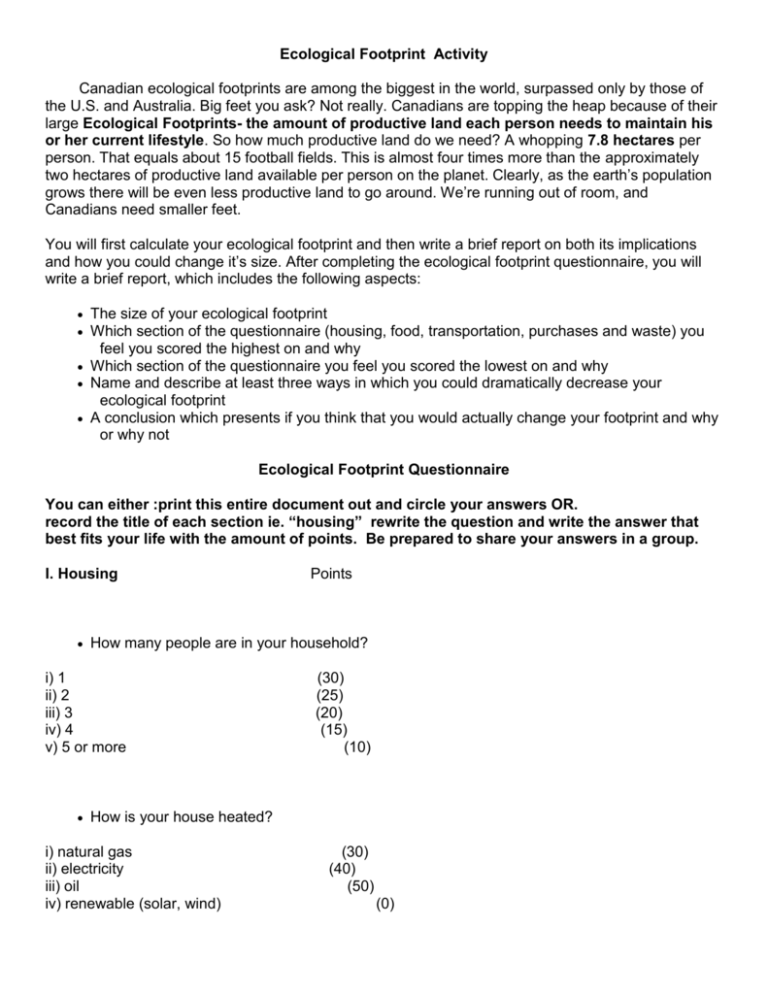
Ecological Footprint Activity Canadian ecological footprints are among the biggest in the world, surpassed only by those of the U.S. and Australia. Big feet you ask? Not really. Canadians are topping the heap because of their large Ecological Footprints- the amount of productive land each person needs to maintain his or her current lifestyle. So how much productive land do we need? A whopping 7.8 hectares per person. That equals about 15 football fields. This is almost four times more than the approximately two hectares of productive land available per person on the planet. Clearly, as the earth’s population grows there will be even less productive land to go around. We’re running out of room, and Canadians need smaller feet. You will first calculate your ecological footprint and then write a brief report on both its implications and how you could change it’s size. After completing the ecological footprint questionnaire, you will write a brief report, which includes the following aspects: The size of your ecological footprint Which section of the questionnaire (housing, food, transportation, purchases and waste) you feel you scored the highest on and why Which section of the questionnaire you feel you scored the lowest on and why Name and describe at least three ways in which you could dramatically decrease your ecological footprint A conclusion which presents if you think that you would actually change your footprint and why or why not Ecological Footprint Questionnaire You can either :print this entire document out and circle your answers OR. record the title of each section ie. “housing” rewrite the question and write the answer that best fits your life with the amount of points. Be prepared to share your answers in a group. I. Housing How many people are in your household? i) 1 ii) 2 iii) 3 iv) 4 v) 5 or more Points (30) (25) (20) (15) (10) How is your house heated? i) natural gas ii) electricity iii) oil iv) renewable (solar, wind) (30) (40) (50) (0) How many individual faucets (taps in your kitchen, bathrooms, laundry room and outside) and toilets do you have in your house? i) less than 3 ii) 3 to 5 iii) 6 to 8 iv) 8 to 10 v) more than 10 (5) (10) (15) (20) (25) What type of home do you live in? i) apartment/condominium ii) house (20) (40) II. Food How many meals per week do you eat meat or fish? i) 0 ii) 1 to 3 iii) 4 to 6 iv) 7 to 10 v) more than 10 How many home-made meals do you eat per week (including those you bring to school/work)? i) under 10 ii) 10 to 14 iii) 14 to 18 iv) more than 18 (0) (10) (20) (35) (50) (25) (20) (15) (10) When purchasing your food items, does your family try to buy locally produced foods? i) yes ii) no iii) sometimes iv) rarely v) don’t know (25) (125) (50) (100) (75) III. Transportation If you or your family own/use a car, what type of car is it? i) motorcycle ii) small compact iii) mid-sized iv) full-sized v) sports utility vehicle or van vi) pick-up truck (15) (35) (60) (75) (100) (130) How do you get to school/work? i) car (50) ii) public transit (bus, streetcar, subway, train) iii) school bus (20) iv) walk (0) v) bicycle or roller blade (0) How many trips do you make per week on public transit that you would have otherwise used a car? i) 0 ii) 1 to 5 iii) 6 to 10 iv) 11 to 15 v) more than 15 (50) (40) (30) (20) Where did you go on your most recent vacation (within the last year)? i) no vacation ii) Ontario iii) outside of Ontario, but within Canada iv) the United States v) outside of North America (25) (0) (10) (30) (40) (70) How many weekends in the summer do you take weekend trips by car (e.g. going to a cottage, camping etc.) ? i) 0 ii) 1 to 3 iii) 4 to 6 iv) 7 to 9 v) more than 9 IV. Purchases (0) (10) (20) (30) (40) How many large purchases (e.g. stereo, TV, VCR, home computer, car, furniture, fridge, stove etc.) has your household made in the last year? i) 0 ii) 1 to 3 iii) 4 to 6 iv) more than 6 (0) (15) (30) (45) Have you bought any more energy-efficient products in the last year (e.g. light bulbs, fridges, stoves, furnaces) ? i) yes ii) no (0) (25) V. Waste Does your household try to reduce the amount of waste generated in the house (e.g. buying food in bulk, refusing junk mail/flyers, using reusable containers for storage, using natural cleaners for household cleaning)? i) always ii) sometimes iii) rarely iv) never Does your household compost? i) always ii) sometimes iii) rarely iv) never (0) (10) (20) (30) (0) (10) (15) (20) Does your household recycle newspapers, cardboard boxes/ boxboard/ pizza boxes, fine paper, aluminum cans, glass/plastic bottles and other materials? i) always ii) sometimes iii) rarely iv) never (0) (10) (15) (20) How many garbage bags of waste do you leave at the curb each week for pick up? i) 0 ii) one half-full garbage bag iii) 1 iv) 2 v) more than 2 (0) (5) (10) (20) (30) Estimating your Ecological Footprint Total your score by adding up the circled values from the above questions. Your score = ___________________ From the information collected in this questionnaire, your estimated “personal” ecological footprint is: 1. Less than 150 2. 150 to 350 - Ecological Footprint under 4.0 hectares - Ecological Footprint is between 4.0 and 6.0 hectares 3. 350 to 550 - Ecological Footprint is between 6.0 and 7.7 hectares (the Canadian average) 4. 550 to 750 5. More than 750 - Ecological Footprint between 7.7 and 10.0 hectares - Ecological Footprint is greater than 10.0 hectares

